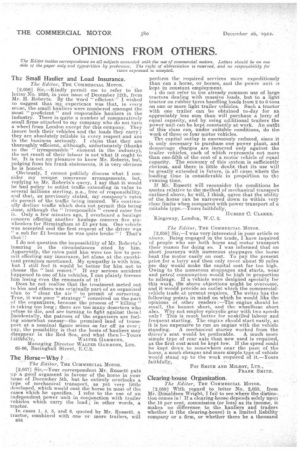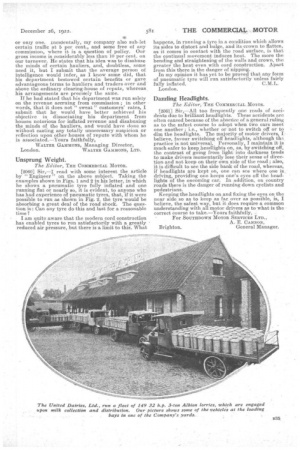OPINIONS FROM OTHERS.
Page 26

Page 27

If you've noticed an error in this article please click here to report it so we can fix it.
The Editor invites correspondence on all subjects connected with the use of commercial motors. Letters should be on one side of the paper only and typewritten by preference. The right of abbreviation is reserved, and no responsibility for views expressed is accepted.
The Small Haulier and Load Insurance.• The Editor, THE. COMMERCLAL MOTOR. .
[2,05±3] Sir,—Kindly permit me to refer to the letter No. 2050, in your issue of December 12th, from Mr. H. Roberts. By the word " efficient" I wished to suggest that nix experience was that, in every sense, the small hauliers were numbered amongst the most " proficient" and responsible hauliers in the industry. There is quite a. number of comparatively small firms attached to my company who do not turn ii wheel from London except for this company. They insure both their vehicles and the loads they carry ; they are absolutely reliable in every respect and are in the business seriously. I claim that they are thoroughly -efficient, although, unfortunately (thanks to the "irresponsible " element in the industry), the net result of their labour is not what it ought to be. It is not my pleasure to know Mr. Roberts, but, judging from his frank statements, it is very obvious he is honest.
Obviously, I cannot publicly discuss what I consider my unique insurance arrangements, but, replying to Mr. Roberts's query, I say that it would be bad policy to sublet traffic extending in value to several millions sterling, p.a., free of responsibility, and that, as previously stated, my company's rates do permit of the traffic being insured. We continually decline traffic which does not permit this being done, although the " irresponsible ' crowd cater for it. Only a few minutes ago, I overheard a haulage concern offering another haulage concern • five sixwheelers for Birmingham at Li per ton. One vehicle was accepted and the first request of the driver was. " a, sub for £1 because he was quite broke" I That's that ! !
I do not question the impossibility of Mr. Roberts's insuring in the circumstances cited by him. Apparently, the rates paid him were too, low to permit effecting any insurance, let alone at the exorbitant premium mentioned. My sympathy is with him, but I still feel it would be better for him not to choose the "lath resort.." If any serious accident happened to one of his vehicles, I can plainly foresee him losing even the remnants of it !
Does he not realize that the treatment meted out to him and others was originally part of an organized nlaii to " clear the air ' to permit of cornering. True, it was poor " strategy" conceived on the part of the organizers, because the process of " killing " is taking too long; there are too many deserters who refuse to die, and are turning to fight against them! Incidentally, the patrons of the organizers are feeling somewhat uneasy—the promised land of transport at a nominal figure seems as far off as ever ; nay, the possibility is that the hosts of hauliers may disappear in the Red Sea, and what then ?—Yours
ftithfully, WALTER GAMMONS, Managing Director WALTER GAMMONS, LTD. 65-66, Basinghall Street, E.C.2.
The Horse—Why ?,-, The Editor, THE COMMERCIAL MOTOR.
[2,057] Sir,—Your correspondent Mr. Russett puts up a good argument in favour of the horse in your issue of December 5th, but he entirely overlooks a type of mechanical transport, as yet very little developed, which would oust the horse in most of the cases which he specifies. I refer to the use of an independent power unit in eonjunction with trailer vehicles which carry the load ; in other words, a tractor.
In cases 1. 4, 5. and 6, quoted by Mr. Russett, tractor, combined with one or more trailers, will n34 perform the required services more expeditiously than can a horse, or horses, and the power unit, ;s kept in constant employment. I do not refer to the already common use of large tractors dealing with massive loads, but to a light tractor on rubber tyres handling loads from 2 to 6 tons on one or more light trailer vehicles. Such a tractor with one trailer can be obtained to-day for an appreciably less sum than will purchase a lorry of equal capacity, and by using additional trailers the power unit can be kept constantly at work. An outfit of this class can, under suitable conditions, do the work of three or four motor vehicles.
The capital outlay is enormously reduced, since it is only necessary to purchase one power plant, and demurrage charges are incurred only against the trailer vehicles, each of which represents not more than one-fifth of the cost of a motor vehicle of equal capacity. The economy of this system is sufficiently obvious, and there is little doubt that its use will be greatly extended in future, in all cases where the loading time is considerable in propdition to tha running time. If Mr. Bassett will reconsider the conditions he quotes relative to the method of mechanical transport outlined above, he will, I think, agree that the utility of the lorse can be narrowed down to within very close limits when compared with power transport of a suitable type.—Yours faithfully,
IlusERT C. CLARKE. 'Kingsway, London, W.C. 2.
The Editor, THE COMMERCIAL MOTOR.
[2,058] Sir,—I was very interested in your article re above. Being engaged in the trade, I have inquired of people who use both horse and motor transport their reason for doing so. I was informed that on short journeys with numerous stoppages the horse beat the motor easily on cost. To pay the present price for a lorry and then only cover about 20 miles per day would make the capital cost far too high. Owing to the numerous stoppages and starts, wear and petrol consumption would be high in proportion to mileage. If a, vehicle were designed specially for this work, the above objections might be overcome, and it would provide an outlet which the commercialvehicle trade at present requires. The writer has the following points in mind on which he would like the opinions of other readers :—The engine should be small, the bonnet short, and the wheelbase short also. Why not employ epicyclic gear with two speeds only ? This is much better for unskilled labour, and frequent starting. The engine should start easily, as it is too expensive to run an engine with the vehicle
standing. A mechanical starter worked from the driver's seat would be preferable. A much more simple type of rear axle than now used is required, as the first cost must be kept low. If the speed could be kept down to somewhere near the pace of the horse, a much cheaper and more simple type of vehicle would stand up to the work required of it.—Yours faithfully,
For SMITH AND MILROY, LTD.,
FRANK SMITH.
Clearing-house Organization.
The Editor, THE COMMERCIAL MOTOR.
[2,059] With regard to letter No. 2033,, from Mr. Donaldson Wright, I fail to see where the distinction blames in ! If a clearing-house depends solely upon the 10 per cent. commission (or less) as its income, it makes no difference to the hauliers and traders whether it (the clearing-house) is a limited liability company or a firm, or whether there be a thousand or only one. Incidentally, my company also sub-let certain traffic at 5 per cent., and some free of any commission, where it is a question of policy. Our gross income is considerably less than 10 per cent, on our turnover. He states that his idea was to disabuse the minds of eertain hauliers, and, doubtless, some need it, but I submit that the average person of intelligence would infer, as I know some did, that his department bestowed certain benefits or gave advantageous terms to hauliers and traders over and above the ordinary clearing-house of repute, whereas his arrangements are precisely the same.
If he had stated that his department was run solely on the revenue accruing from commission ; in other words, that it does not " sweat " customers' rates, I submit that he would have better achieved his objective in dissociating his department Trom houses notorious for inflated revenue and disabusing the minds of the hauliers, and would have done so without casting any totally unnecessary suspicion or reflection upon other houses of repute with whom he is associated.--Yours faithfully,
WALTER GAMMONS, Managing Director, London. WALTER GAMMONS, LTD.
Unsprung Weight.
The Editor, THE COMMERCIAL MOTOR.
[2060] Sir,—I read with some interest the article by " Engineer " on the above subject. Taking the examples shown in Figs. 1 and 2 in his letter, in which he shows a pneumatic tyre fully inflated and one running flat or nearly so, it is evident, to anyone who has had experience of pneumatic tyres, that, if it were possible to run as shown in Fig. 2, the tyre would be absorbing a great deal of the road shock. The question is : Can any tyre do this and last for a reasonable time 7
I am quite aware that the modern cord construction has enabled tyres to run satisfactorily with a greatly reduced air pressure, but there is a limit to this. What happens, in running a tyre in a condition which allows its sides to distort and bulge, and its crown to flatten, as it comes in contact with the road surface, is that the continual movement induces heat. The more the bending and straightening of the walls and crown, the greater the heat even with cord construction. Apart from this there is the danger of nipping. In my opinion it has yet to be proved that any form of pneumatic tyre will run satisfactorily unless fairly fully inflated. C.M.L. London.
Dazzling Headlights.
The Editor, THE COMMERCIAL MOTOR.
[2061] Sir,—All too frequently one reads of accidents due to brilliant headlights. These accidents are often caused because of the absence of a general ruling as to the safest course to adopt when two cars meet one another i.e., whether or not to switch off or to dim the headlights. The majority of motrir drivers, I believe, favour switching off headlights, although the practice is not universal. Personally, I maintain it is much safer to keep headlights on, as, by switching off, the contrast of going from light into darkness tends to make drivers momentarily lose their sense of direction and not keep on their own side of the road ; also, it is difficult to see the side bank of the road, whereas, if headlights are kept on, one can see where one is. driving, providing one keeps one's eyes off the headlights of the oncoming car. In addition, on country roads there is the danger of running down cyclists and pedestrians. Keeping the headlights on and fixing the eyes on the near side so as to keep as far, over as possible, is, I believe, the safest way, but it does require a common understanding with all motor drivers as to what is the correct course to take.—Yours faithfully.
For SOITTHDOWN MOTOR SERVICES LTD,
A. E. CANNON,
Brighton. General Manager.






























